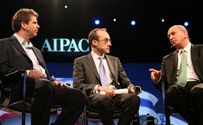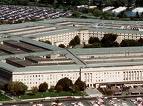Related series by DeepJournal: The Other Face of Barack Obama.
By Daan de Wit
Translated by Ben Kearney
'America's Pro-Israel Lobby', as AIPAC calls itself, holds the biggest conference in its history today, yesterday and the day before in Washington. 'This year, the lobby has built its annual conference, and its entire lobbying agenda around the issue of Iran', writes Haaretz. AIPAC is very influential, and Washington fears the long arm of the lobby. One of the resources it employs is the Office of Terrorism and Financial Intelligence (TFI). Grant Smith, the director of the Institute for Research: Middle Eastern Policy compares the TFI with the OSP, the illustrious Office of Special Plans during the time of George W. Bush in the run-up to the Iraq war.
 Just as America needs Israel, AIPAC needs Washington - both for support and for financial resources, and certainly with regard to the Iranian problem. 'When AIPAC activists mount the buses March 23 to go meet their representatives on Capitol Hill, they'll be carrying an advocacy message that emphasizes Iran as the immediate and current concern. In lobbying meetings following the conference, AIPAC will also ask members of Congress to complete the new Iran sanctions bill, which has passed both chambers and is now awaiting reconciliation between the two versions in the conference committee', writes Haaretz. The paper also writes that AIPAC will urge members of Congress to sign a letter to the White House. In the letter, the United States is called on to bypass the UN Security Council by imposing sanctions on Iran.
Just as America needs Israel, AIPAC needs Washington - both for support and for financial resources, and certainly with regard to the Iranian problem. 'When AIPAC activists mount the buses March 23 to go meet their representatives on Capitol Hill, they'll be carrying an advocacy message that emphasizes Iran as the immediate and current concern. In lobbying meetings following the conference, AIPAC will also ask members of Congress to complete the new Iran sanctions bill, which has passed both chambers and is now awaiting reconciliation between the two versions in the conference committee', writes Haaretz. The paper also writes that AIPAC will urge members of Congress to sign a letter to the White House. In the letter, the United States is called on to bypass the UN Security Council by imposing sanctions on Iran.
The Office of Terrorism and Financial Intelligence
One of the ways in which pressure is exerted on Iran is the TFI, the Office of Terrorism and Financial Intelligence. Grant Smith, director of the IRmep, the Institute for Research: Middle Eastern Policy, writes that 'AIPAC and its associated think tank, the Washington Institute for Near East Policy (WINEP), were instrumental in lobbying the president for the creation of the Office of Terrorism and Financial Intelligence unit early in 2004'. This entity employs financial resources like a crowbar against the defenses that Iran tries to maintain.
 Smith explains in an interview (4:25) that since 2004 the Office of Terrorism and Financial Intelligence (TFI) has been housed in the Treasury Department. It's led by someone appointed by Bush and retained by Obama, Stuart Levey. The Wall Street Journal writes: '[...] Stuart Levey, will travel to Switzerland, Saudi Arabia, the United Arab Emirates and Oman. "We are pointing out that they face dramatic risks by doing business with Iran," Mr. Levey said in an interview Tuesday'. Smith: 'It looks as though what it's trying to do is to surround and encompass Iran and maybe, if they're really lucky, get them to leave the Non Proliferation Treaty so that Iran can become an even easier target. [...] It's rapidly proven itself to be mainly a sharp edged tool for setting a lot of these trip wires'.
Smith explains in an interview (4:25) that since 2004 the Office of Terrorism and Financial Intelligence (TFI) has been housed in the Treasury Department. It's led by someone appointed by Bush and retained by Obama, Stuart Levey. The Wall Street Journal writes: '[...] Stuart Levey, will travel to Switzerland, Saudi Arabia, the United Arab Emirates and Oman. "We are pointing out that they face dramatic risks by doing business with Iran," Mr. Levey said in an interview Tuesday'. Smith: 'It looks as though what it's trying to do is to surround and encompass Iran and maybe, if they're really lucky, get them to leave the Non Proliferation Treaty so that Iran can become an even easier target. [...] It's rapidly proven itself to be mainly a sharp edged tool for setting a lot of these trip wires'.
'The TFI is like the OSP, the Office of Special Plans'
Smith compares the TFI with the OSP, the Office of Special Plans. That was the notorious intelligence unit housed in the Pentagon that had direct access to the White House during the lead-up to the Iraq war. The agency's goal was to replace the CIA's weighted  intelligence on Iraq with raw data. This was then presented as proof of Iraq's evil intentions, with all of its consequences. The irony was that it was the CIA that took the blame for this afterwards. DeepJournal reported extensively on the OSP at the time.
intelligence on Iraq with raw data. This was then presented as proof of Iraq's evil intentions, with all of its consequences. The irony was that it was the CIA that took the blame for this afterwards. DeepJournal reported extensively on the OSP at the time.
It's worrying that Smith claims that similar practices are being carried out under Obama. Smith says: 'All of the things we saw before the Iraq war... If you were an Antiwar listener and knew a lot about the Office of Special Plans, you knew it was essentially a black box that had very little public disclosure into what it was doing around the world. You knew that it was hard-wired to the Israel lobby and you knew it was also diverting the institution it was housed in [the Pentagon] away from it's mandate [... The TFI is] even less transparent than the Office of Special Plans'.
McGovern: Israel is the elephant in the room
Smith writes : 'Invited guests and members of WINEP have received many intimate briefings from TFI officials and consultants —possibly more than the entire US Congress'. Yet at a recent discussion hosted by the U.S. Senate, barely a word was mentioned about what former CIA intelligence analyst Ray McGovern calls the proverbial elephant in the room: Israel.
 For McGovern, ignoring the elephant has its roots in the 'time-worn “passionate attachment” of U.S. leaders to Israel's short-term interests as if they were identical to those of the United States'. Or as U.S. Vice President Joe Biden put it earlier this month in Israel: 'The cornerstone of the relationship is our absolute, total, unvarnished commitment to Israel's security. Bibi, you heard me say before, progress occurs in the Middle East when everyone knows there is simply no space between the United States and Israel. There is no space between the United States and Israel when it comes to Israel's security. And for that reason, and many others, addressing Iran's nuclear program has been of -- one of our administration's priorities'.
For McGovern, ignoring the elephant has its roots in the 'time-worn “passionate attachment” of U.S. leaders to Israel's short-term interests as if they were identical to those of the United States'. Or as U.S. Vice President Joe Biden put it earlier this month in Israel: 'The cornerstone of the relationship is our absolute, total, unvarnished commitment to Israel's security. Bibi, you heard me say before, progress occurs in the Middle East when everyone knows there is simply no space between the United States and Israel. There is no space between the United States and Israel when it comes to Israel's security. And for that reason, and many others, addressing Iran's nuclear program has been of -- one of our administration's priorities'.
According to McGovern, Israel has U.S. policy towards Iran in a stranglehold. His solution: 'This politically super-sensitive issue needs to be addressed openly and without fear'. 'Otherwise, there is virtually no prospect of lessened tensions, and a near-term prospect that things can get dramatically worse — an Israeli provocation and/or a preventive strike on Iran, for example'.

 mail this article
|
mail this article
|
 print
|
print
| 
 | DeepJournal
| DeepJournal
 Just as America needs Israel, AIPAC needs Washington - both for support and for financial resources, and certainly with regard to the Iranian problem. 'When
Just as America needs Israel, AIPAC needs Washington - both for support and for financial resources, and certainly with regard to the Iranian problem. 'When  Smith explains in an
Smith explains in an  intelligence on Iraq with raw data. This was then presented as proof of Iraq's evil intentions, with all of its consequences. The irony was that it was the CIA that took the blame for this afterwards. DeepJournal
intelligence on Iraq with raw data. This was then presented as proof of Iraq's evil intentions, with all of its consequences. The irony was that it was the CIA that took the blame for this afterwards. DeepJournal  For McGovern, ignoring the elephant has its roots in the 'time-worn “passionate attachment” of U.S. leaders to Israel's short-term interests as if they were identical to those of the United States'. Or as U.S. Vice President Joe Biden
For McGovern, ignoring the elephant has its roots in the 'time-worn “passionate attachment” of U.S. leaders to Israel's short-term interests as if they were identical to those of the United States'. Or as U.S. Vice President Joe Biden